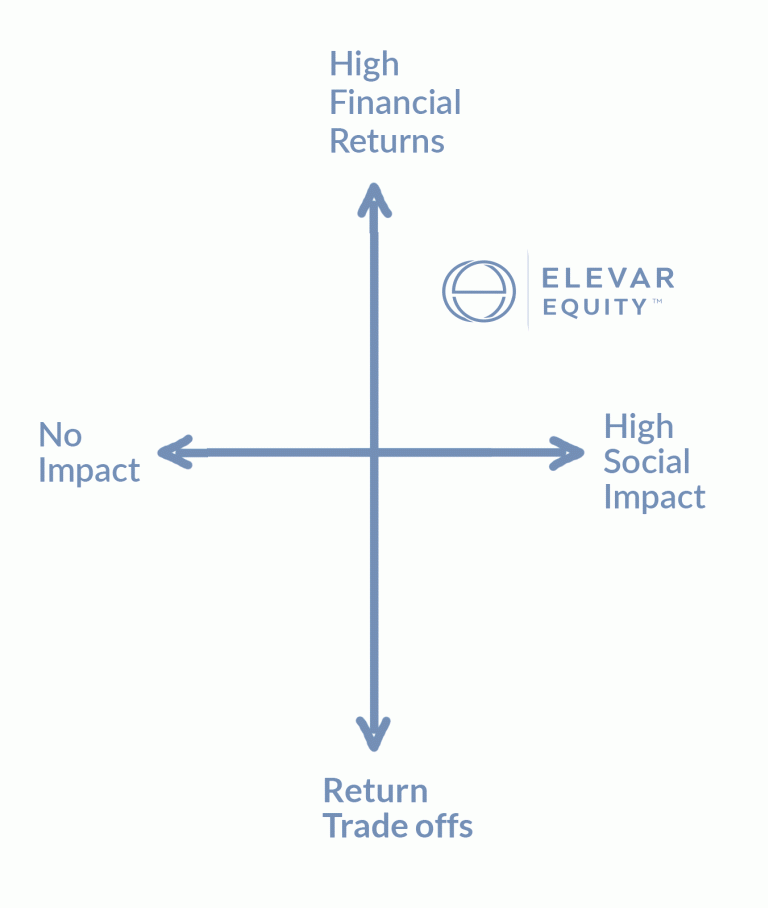
We believe that every community and person has intrinsic economic and social value. Elevar’s customers live in economically vibrant, entrepreneurial communities and yet lack access to mainstream markets. This lack of connection – whether caused by oversight, discrimination, poverty or other obstacles – represents a highly inefficient condition that is best solved through access provided by entrepreneurial, scalable, customer focused business models.
Accordingly, our entire investment focus is to capitalize entrepreneurs who bring significant execution experience and an in-depth understanding of the customer to create formal access for underserved communities through the provision of quality essential services (such as financial services, housing, healthcare, education and communication).
Elevar therefore identifies investments where fundamentally, the objectives of customer impact and commercial returns are aligned.
Elevar’s thematic investing has catalyzed billions of dollars for millions of customers to democratize essential services. As of March 2016, the 24 companies we’ve backed through our three funds (total committed capital of USD 166 Million) have served over 20 million households through over 6,000 customer outlets (branches or customer touch points). These companies have created over 40,000 jobs.
Our initial equity investments have helped these companies raise over USD 800 million in equity capital and over USD 8 billion of debt to cater to their customers to date.
Our investment framework is built around four key factors that keep us true to these objectives:

Follow the customer and his/her wallet – i.e. demonstrated demand
Every member of the Elevar family personally spends time with customers to understand what they are spending money on and the gaps that exist in the services and products the local ecosystem offers – i.e. the customers’ current alternatives. We use our understanding to validate secondary research and form our investment thesis.
In 2009, we spent time with our microfinance portfolio customers and learnt that over 40% owned their homes and there was demand for credit to finance new home purchase / construction as well as to implement home improvement projects. A more nuanced understanding of this observation led us to an investment in Shubham, one of the first branch-distribution led housing finance companies that caters to the low income customer segment in India to improve their current housing stock. While several other low income housing companies were founded at a similar time, their business models relied on partnering with low cost real-estate developers whose businesses hinged on moving people out of their communities to new settlements. Partly because of its community-focused model as opposed to a developer led model, Shubham is amongst the fastest growing housing finance companies in this segment today.
Back entrepreneurs who have passion, execution experience and in-depth customer understanding
The entrepreneurs we invest in typically come through proprietary networks that we have cultivated in the markets in which we invest. We look for two important characteristics in entrepreneurs: first, demonstrated execution experience in professionally-run organizations and second, their customer focus and understanding of the on-the-ground realities. We often do this by observing the entrepreneurs in the field, as they engage with their target market. We believe this is the key to efficient scaling of businesses and outreach to millions of customers.
In 2010, the entrepreneur who set up Vistaar, a small business loan company in India that we funded from inception, walked us through the economics of how an individual cow yield translates to a dairy business, which in turn impacts the economics of the local ecosystem. This is one example of how granular understanding of livelihood verticals allowed the entrepreneur to scale through specific underwriting expertise. The entrepreneur and his co-founder brought to the table over 55 years of combined experience across commercial, agriculture/microfinance banking, technology, and retail operations.
Invest in businesses that are margin-efficient and custom-built for the target customer segment
Our investing and operating experience in our markets has helped us identify models that are fundamentally profitable at a ‘unit level’ while focusing completely on these communities. This ensures that the focus on serving these communities is not compromised at later stages of business and we are aligned with the entrepreneur in terms of the company’s vision. Innovation may occur at the level of product design, product delivery/distribution channel or organizational design – all keeping the target customer segment in mind. There are business models that do not fundamentally lend themselves to cater to our target customer segment and often entrepreneurs resort to cross-subsidizing services offered to the lower income communities – these are not Elevar investments. Elevar’s focus is on business models purpose-built for lower income communities. In other words, alignment with LAhWS is a necessary condition.
In 2011, we invested in Glocal – a rural, primary and secondary healthcare services provider in India which developed a proprietary, low cost delivery model to bring quality care to the low income segment. With this customer segment we recognized that despite a real ability to pay, quality care continued to be out of reach with limited alternatives available beyond poorly managed local Primary Healthcare centres. Through empirical, on the ground research, Glocal’s management found that approximately 17 diseases constitute 85% and 42 diseases make up 95% of the disease load in rural India. By designing a facility focused on addressing these conditions and protocolizing healthcare, Glocal has dramatically brought down the capital expenditure cost per hospital and the cost of service delivery to patients.
Massively scalable solutions
The nature of the businesses we invest in is ‘low price point’ and consequently ‘low margin’ as we are focused on providing high value, but cost efficient solutions to low-income communities that mainstream businesses have failed to cater to over time. As a result, the one parameter that enables a low margin business to generate strong profits is ‘scale’. While macro-economic data suggests that the market we are approaching has billions of potential customers, we have found it critical to validate the readiness of target markets / the ecosystem, and the simplicity of the core business unit (branch / customer outlet) to ensure rapid replication under the right leadership. The ability to scale is what drives superior return on equity within the time-frame envisaged by our fund as well as the goal of greater inclusion / access to services for our target customer base.
GloboKasNet (GKN), currently operating in Peru, provides transaction processing and settlement services that enable financial institutions to reach out to small ticket customers who need more convenient access points to complete their small financial transactions and pay bills. GKN’s technology neutral platform and their ability to build a multi-bank, independent agent distribution model in Peru were important factors for us to ensure that we were investing in a scalable model that could target a very large market and benefit from network effects. At the time of initial investment (in 2010), the 570 ‘active agents’ (point of service / units) working with the company, had demonstrated that this model was replicable and scalable. GKN, since then, has grown its agent base by over 7 times and increased its monthly transaction volume by over 10x.
We believe commercial success inspires greater capital flows in order to help serve the end customers and the two are inextricably linked. Our portfolio companies have demonstrated this over and over again.